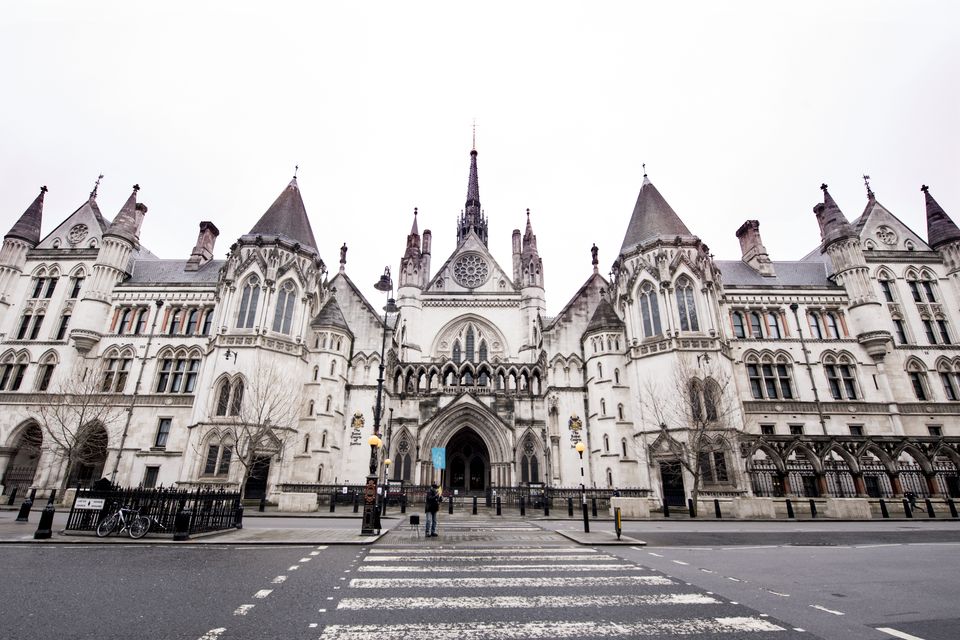
The Royal Courts of Justice in London (Ian West/PA)
The London Metal Exchange (LME) is facing legal action over allegations that it enables the global sale of “dirty metals” – those mined against a backdrop of environmental and human rights abuses.
The London Mining Network, a coalition of environment and human rights groups supporting communities harmed by London-based mining companies, filed a legal action on Thursday at the UK High Court against the LME, which is one of the main commodities markets in the world.
The group, which is supported by the Global Legal Action Network (Glan), argued that the Exchange is in breach of anti-money laundering and proceeds of crime legislation by enabling the global sale of “dirty metals”.
The case detailed the LME’s trading of metal from the Grasberg Mine in West Papua, Indonesia, which has been linked to violence and environmental destruction.
The team behind the legal action said the West Papua indigenous communities are suffering the effects of mining waste pollution from the mine, which is being dumped into water sources.
They claim more than 200,000 tonnes of toxic mining waste, known as “tailings”, are thrown into local rivers every day, causing rivers to disappear and widespread health problems in the community.
Currently, the Exchange has a policy on responsible sourcing which requires all of its listed brands to comply with a set of requirements.
These aim to ensure the brands’ supply chains respect human rights and do not contribute to conflict financing or corruption, while occupational health and safety risks as well as environmental risks are managed on their own sites.
If the case is successful, the Glan and London Mining Network said it could force the LME to revisit the rules under which it lists metal for trading on its exchange, and in turn force metal producers to adapt their mining practices if they want to maintain access to the marketplace.
This could also mean the Grasberg Mine’s American and Indonesian operators will have to ensure there are no exploitative mining practices which harm the environment and indigenous communities if they want their product to remain listed on the Exchange, they added.
The team argued that the copper derived from the mine is “criminal property” as it is produced in circumstances that would breach UK criminal law if they were to occur in the UK.
Failure by the LME to exclude these commodities triggers liability under the Proceeds of Crime Act (2002), they added.
The legal action could also have implications for other companies whose mining operations are linked to environmental crimes overseas in accessing the Exchange.
The team said the environmental harms in West Papua are symptomatic of a deeper systemic problem across the world, with similar patterns identified with mining corporations operating in Brazil, Peru, Guinea and the Russian Federation.
Adolfina Kuum, a West Papuan community leader, said, “This case is about our fight against those who profit from the destruction of our people’s rivers, our forests and way of life.
“Our communities are experiencing the life-threatening effects of mining, we have no choice but to take up this fight because if we remain silent who will speak for us?
“We call on all businesses, including banks and exchanges, such as the London Metal Exchange, to end their international complicity with these mining operations.”
Leanna Burnard, a Glan lawyer, said: “This is a groundbreaking legal action that, if successful, could reverberate through supply chains around the globe.
“The LME is the largest metals trading platform in the world. If the courts require the LME to prevent the trading on its platform of metals produced through environmental crime, it could trigger a global improvement in mining practices.
“This would have a profound impact on mining-affected communities around the world and see significant improvements to their livelihoods and the environment.”
Andrew Hickman, from the London Mining Network, said: “The Grasberg mine in West Papua, from which the copper traded on the London Metals Exchange is produced, is like a suppurating ulcer in the heart of the rainforests of New Guinea.
“It is time for those who benefit from the production and trade in these metals from West Papua to be held accountable for their crimes.”
LME said that, as of January 15, it plans to suspend or delist 10% of all listed brands due to them not yet submitting appropriate compliance information to meet its responsible sourcing policy.
PA has contacted the LME for comment.
No comments:
Post a Comment